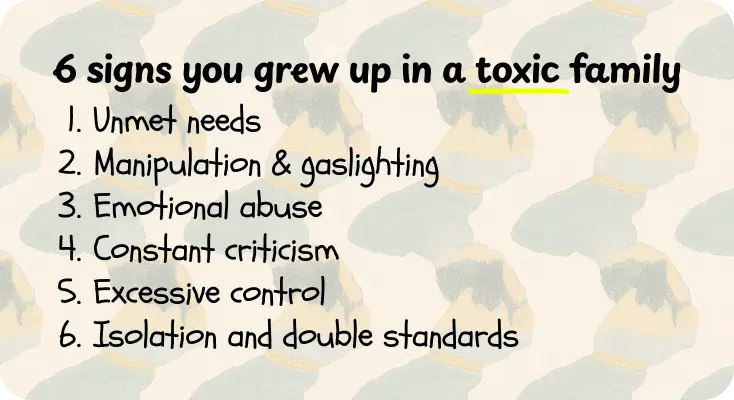Key takeaways
- In a toxic family, its members treat each other in destructive or controlling ways. This usually harms the mental stability of everyone in the family.
- The main signs of a toxic family are unmet needs, manipulation and gaslighting, emotional or verbal abuse, constant criticism, excessive control, isolation, and double standards.
- The most common outcomes of living with toxic family members are low self-esteem, trust issues, increased anxiety, difficulties with expressing emotions, and potential mental health conditions.
- To deal with family members who disrespect you, it might be helpful to set clear boundaries, stop trying to change certain family members, and reduce interactions with them, if necessary.
Living with toxic or abusive family members can lead to childhood trauma and have lasting outcomes on your life. Take a quick & free test to recognize whether past experiences still impact your emotions.
What is a toxic family?
The American Psychological Association defines a toxic (dysfunctional) family as one in which relationships or communication are impaired and members are unable to attain closeness and self-expression. [1] Nevertheless, this definition can be enlarged.
A toxic family is one where certain repeated behaviors hurt its members and have a negative influence on their well-being. These might include constant criticism, control, guilt-tripping, emotional or physical abuse, name-calling, unrealistic expectations, and frequent conflicts.
Instead of covering basic needs, providing emotional support, and closeness (like in a healthy family system), a toxic family environment is filled with negativity. This unhealthy environment shapes members into dysfunctional roles that can make them stuck in fixed behavioral patterns.
There’s also some difference between the terms “toxic” and “abusive” family. While abuse is more obvious and can include physical or severe psychological harm, toxicity is less obvious but still permanent. After some time, a person who lives in a toxic family might face severe emotional outcomes that are similar to those caused by abuse. Also, toxic families may pass some behavioral patterns from generation to generation, so they feel “normal” and are hard to recognize.
Toxic family test
Let’s quickly assess whether your family is toxic. Please answer the questions below. Choose only one option for each question. Then, jot down the totals and proceed to the results.
1. How do you feel about your boundaries and their respect by other family members?
- I’ve always had clear boundaries, and my family members haven’t tried to cross them. (0 points)
- Sometimes, my boundaries may be blurred because family members try to cross them. Still, most of the time, everything is pretty okay. (1 point)
- I don’t have clear boundaries because my parents always told me that setting myself apart from them is selfish. Thus, now I struggle to establish them. (2 points)
2. How often does your family criticize you?
- Quite rarely, and only after I made significant mistakes. (0 points)
- From time to time. In some cases, their criticism felt constrictive. However, in others, I really didn’t understand where my fault was. (1 point)
- All the time. Anything I do is wrong! I’m doing my best, and I’m so tired of this hurtful criticism. (2 points)
3. When you set a goal and tell family members about it, they…
- Listen to me with interest and then try to support or help me reach the goal. I’m so grateful! (0 points)
- Half-listen to me and then warn about possible roadblocks. Sometimes, I start believing that they try to make me give up on my plans. (1 point)
- My relatives never believe in me! Whatever I say, they always state that it’s impossible and dismiss my ideas outright, making me doubt myself before I even begin. (2 points)
4. How often do you feel that you live in unhealthy family dynamics and others manipulate you?
- It doesn’t happen in my family. And even if I notice someone doing it unconsciously, I will say, and they will stop immediately. (0 points)
- Quite rarely, but I notice some attempts to manipulate me and my decisions. Most often, these manipulations are minor but still emotionally draining. (1 point)
- Far too often. It feels like they’re pulling the strings behind the scenes, and I’m left questioning my choices and feelings. (2 points)
5. How do you feel after family gatherings?
- I’m happy and excited to see everyone at a festive table. Even if there are some tense moments, we fix them quite quickly. (0 points)
- It’s a mix of emotions. While I enjoy seeing everyone, there are often some awkward situations that make me sad. (1 point)
- Super-exhausted and devastated! I feel like I need 10 therapy sessions after one family dinner. (2 points)
How toxic are your family members — Results of the test
Now, you’re ready to find out what kind of relationships were in your family. We’ve looked at the common signs of dysfunctional behavior and evaluated whether they resonate with your experience.
0-3 points. You don’t seem to live in toxic family dynamics.
This test can’t cover all possible dynamics and dysfunctions that make up complex family relationships. Yet, your family seems to be pretty happy and nurturing. They support your goals, respect your boundaries, and make you feel safe and valued.
However, if you still feel that something goes wrong, we recommend you keep reading to discover more signs and compare them to your situation. Moreover, sometimes only a licensed therapist can provide a clear overview of the situation.
4-6 points. There might be some signs of dysfunctional family dynamics, but you’ve found ways to cope.
Your family isn’t perfect, and sometimes, their behavior can be unpleasant or stressful. Whether it’s intentional or not, it can leave you feeling drained. Still, you seem to manage to handle everything.
When things get tough, it might be helpful to discuss the issues and set clear boundaries to protect your peace and avoid negative feelings. Self-care should be your priority as well.
In particular, you can take care of your mental health with Breeze’s journaling features. They let you release worry, let go of anxiety, and focus on things you’re grateful for. This is especially useful if you’ve grown up in a toxic family and now want to change your mindset for a more positive one.
7-10 points. Your family members might be rather toxic.
It may be difficult to communicate healthily with your relatives. Whether they disrespect your boundaries, argue all the time, criticize you, or do everything at once, it most probably influences your well-being.
Don’t be afraid to seek support from friends or professionals if you need it.
Do you have good relationships with your family?
Toxic family members: who they are and how they act
Relatives in a dysfunctional family might engage in reactive emotional abuse, control their actions all the time, or even isolate everyone from each other by causing arguments.
“Unhealthy families discourage individual expression. Everyone must conform to the thoughts and actions of the toxic parents. They promote fusion, a blurring of personal boundaries, a welding together of family members.” ― Susan Forward, Ph.D., therapist, lecturer, and author known for her expertise in family relationships.
The hero (golden child)
This is someone who tries to make family seem normal through overachievement and contant perfectionism. Golden children usually get high grades at school, participate in different competitions, and work hard to succeed in their career and make others think that their family is fine.
For example, they might take on extra work or always look perfect in public. This may come from wanting approval and trying to hide negative thoughts about toxic family dynamics.
The scapegoat
This one child or parent is typically blamed for everything. The scapegoat feels that they always do everything wrong and can never meet the family’s expectations. As the Family Journal states, this role is linked to greater depressive symptoms later on during adulthood. [2]
Imagine this: you come home from school with a good grade, but your parents only notice the small mistake you made. Later, your sibling forgets to do their chores, but you still get blamed. This is how scapegoats feel most of the time.
The lost child
Such people typically recognize how toxic their family is and try to withdraw from conflicts at any cost. Lost children might seem shy, introverted, or even emotionally numb. And while this strategy may work within toxic family systems, it can lead to difficulties building relationships and communicating with others.
The clown (mascot)
To lighten up the atmosphere and make daily life less challenging, mascots start behaving like entertainers. They tell funny stories, make jokes, or act silly to distract everyone from tension and conflict. While it can bring short-term relief, the toxic environment remains the same, and serious issues still arise on the surface.
For instance, fun and talkative teenagers who are the life of the party can do this to avoid really close relationships because they have difficulty trusting others. Laughing is their defence mechanism that helps them hide sadness and insecurity.
The caretaker (mediator)
The mediator is someone who tries to help others overcome disagreements. Either staying silent or trying to keep the peace at all costs, such people may unintentionally reinforce the toxic patterns. They often put others’ needs before their own and neglect their feelings to avoid conflict (which is typical for those living with middle child syndrome).
For example, daughters of narcissistic parents can try to do everything their family wants (like cleaning the house, stopping fights, and always agreeing). At the same time, this might make them feel unseen and worthless.
Children of toxic and narcissistic parents might choose partners with similar behavioral patterns. Check whether it’s true about you by taking a simple quiz.
6 signs you grew up in a toxic family
According to the study, toxic relationships in families are characterized by harmful interaction patterns, such as excessive control, emotional manipulation, lack of support, and abusive behavior. [3] Let’s take a closer look at what happens when your family is toxic.
1. Unmet needs
Parents regularly ignore kids’ physical and emotional needs ― from purchasing a new winter jacket to supporting children when they lose in a football match. Sometimes, any parent may forget to buy your favorite sweets or overlook small things you enjoy, like remembering your favorite movie for family movie night. But in toxic families, parents may not even try to care. And this is the difference.
2. Manipulation & gaslighting
Like romantic partners, family members can also use manipulative techniques to control your actions. The only difference is that when you’re a child, you cannot always recognize and avoid this influence. A toxic family member can make you question your reality, make you feel guilty over things that you didn’t do, and force you to second-guess your feelings and decisions.
3. Emotional abuse
Actually, this term can cover dozens of situations when your own family hurts you. A kid experiencing abuse can feel like a black-sheep-of-the-family. Lonely, misunderstood, experiencing constant jokes, and comparison to their siblings — all this might make children believe they are unworthy.
This blame game makes any thoughtful discussion almost impossible, while the only thing such kids are forced to do is to defend themselves. Consequently, this can make it harder to set boundaries in adulthood.
4. Constant criticism
Lack of empathy and support, as well as constant negative feedback, are typical behaviors in toxic family systems.
- “You’ve gained a few pounds; don’t eat so much.”
- “Okay, you’ve passed this difficult exam. But why do you have a B, not an A?”
- “This boy won’t ever fall in love with you. You aren’t beautiful enough.”
These are only a few examples of painful, critical remarks children and teenagers might receive from hurtful and toxic family members. And this is what can make them feel unworthy or inadequate, even when they’ve achieved something significant.
5. Excessive control
From checking a child’s phone every day to deciding what jacket they’ll wear to school, abusive parents might intrude into all areas of life. There’s no clear line between increased care and excessive control. However, if you felt that you couldn’t set clear boundaries in childhood and didn’t have any personal space, it can be one of the signs of a toxic family.
6. Isolation and double standards
Toxic parents, especially narcissistic ones, may approach kids differently and, thus, make them grow up to hate or resent each other. Moreover, they can cut children off from building friendships and connecting with peers and even other family members.
Golden children are always perfect, while blamed kids are always fools, even though sometimes they do the same things. As a result, the kid might feel constantly lonely in this isolation. Children of narcissistic parents may grow up believing, “I’m never enough.” This can influence even those who were set as an example when dealing with other toxic family members.

How a toxic household might have influenced your present
Here are the most common outcomes most adults experience when living with toxic relatives, and even after moving away.
1. Low self-esteem
If you believe that you don’t deserve a happy life, you may carry the weight of the influence of toxic family dynamics. Growing up in this environment might affect your sense of reality, so you start to believe that your needs and emotions are unimportant or that you are always at fault, even when you’re not.
2. Trust issues
People who grew up in a toxic environment may believe that being vulnerable means getting hurt. They’ve learned this lesson so well that they keep their walls up to protect themselves. Because of this, such people find it difficult to build and maintain healthy relationships, which can make them feel lonely.
3. Increased anxiety and emotional distress
Studies prove that higher levels of family dysfunction are closely related to higher levels of anxiety and feelings of loneliness. [4] Children who have witnessed unstable parental behavior can constantly worry about minor events. They may overanalyze situations, expect the worst, or fear criticism, which can turn into social anxiety.
4. Difficulties with expressing emotions
When living with toxic parents, children might learn to suppress their emotions to avoid conflict. They don’t cry when they fall off the bicycle to avoid being called “inattentive.” As a result, these bottled emotions turn into emotional unavailability and hyper-independence in adulthood.
“Being traumatized is not just an issue of being stuck in the past; it is just as much a problem of not being fully alive in the present.” ― Bessel A. van der Kolk, M.D., psychiatrist, author, researcher, and educator.
5. Parentification trauma
When caregivers or relatives can’t meet children’s emotional and physical needs, kids need to become “grown-ups” in their families and take care of themselves, siblings, and even older family members. This is called “parentification” ― a shift in roles that can make a person feel constantly responsible for others and lead to putting everyone’s needs above the person’s own.
6. Depression, substance use, and other mental health challenges
If letting go of a toxic family when you feel emotionally drained is impossible, it can turn into mental health issues. [5] What’s more, a person may develop certain conditions if growing up in a toxic family has left behind childhood trauma that lingers like emotional baggage.
- Depression
- Anxiety disorders
- Post-traumatic stress disorder
- Borderline personality disorder
- Eating disorders
- Substance use disorders
Expert Insight
“When your emotions make it hard to go about your normal day or adhere to your typical responsibilities, it’s important to seek help from a professional. Any impairment or distress can warrant additional resources, and no one should have to face their emotional hardships alone.”
Hannah Schlueter
Mental health professional

How to deal with toxic family members?
Here are some tips to protect yourself and still stay connected with your family.
- Understand that there’s an issue. Appreciating that you experience unhealthy dynamics and have a desire to change them is the first step to your well-being.
- Set boundaries and communicate them. But as an adult, you have autonomy over the boundaries you set. It might be helpful to talk to family members, but if it doesn’t help, protect your boundaries in action.
- Don’t try to change anyone. Acknowledge that your siblings or parents will remain the same. Trying to change someone can lead to disappointment. Instead, focus your energy on changing how you react to their behavior and protect yourself.
- Reduce interactions. If nothing helps, maybe it would be better to cut down on communication. Of course, you can decide to meet them from time to time. But not calling every day might be a wise decision.
- Notice how you feel and adapt to the situation. Use Breeze’s mood tracker to spot situations when you feel stressed. This awareness helps you respond thoughtfully and be more attentive to certain people or situations.
- Focus on your well-being. To handle toxic family members, shift focus to maintaining your emotional balance. Once you prioritize your needs and set boundaries, their toxic behavior will have less impact on your life.
You can engage in self-discovery with Breeze’s science-backed tests and learn a lot of new things about yourself. The imposter syndrome test can provide insights into how to feel more confident, while the social style test will show where your communication strengths lie.
When should I think about cutting off a toxic family?
We asked Hannah Schlueter, MA, LAC, about it, “A person’s decision to limit communication or cut off communication with family members is entirely personal. Everyone has their own deal breakers, however, if your attempted solutions have not been successful and your emotional well-being continues to suffer, it might be time to consider what is best for you. It’s important to remember that you make the decision on your own accord rather than allowing someone to decide for you.”
If you’ve already decided to stop contacting other family members, here are some tips that might be helpful.
1. Decide how you’ll cut the contact
You may want to tell your family about your decision personally. However, their reaction might be unpredictable. If your family members can be aggressive and manipulative or experience mood fluctuations, it may be reasonable to do this through a phone call or message.
2. Get ready to explain your boundaries
If you decide to tell about your feelings personally, it’s better to prepare key points in advance. Avoid going into too much detail, as you may feel like you need to defend yourself. Instead, keep your point clear and remember that you can leave anytime you feel uncomfortable.
3. Prepare for their emotions
You should be ready that your family members can try to argue with you or convince you not to do it. It’s better to have someone who can support you emotionally during and after the conversation.
4. Accept that you might experience mixed reactions as well
Cutting off relatives can make you feel guilty, anxious, or frustrated. At the same time, it can bring a moment of relief. To feel better afterwards, you need to accept that all emotions are normal. If you want to unwind, you can go for a walk, focus on physical activities, or try relaxation games from Breeze that allow you to shift focus to something more pleasant.
Frequently asked questions
What are the signs of a toxic family?
- Unmet physical and emotional needs
- Manipulation and gaslighting that negatively impact the understanding of reality
- Emotional or any other form of abuse
- Constant criticism and diminishing a person’s self-worth
- Excessive controlling behavior
- Isolation from other children and double standards
How do I know if I grew up in a toxic household?
If your family members approached you in unhealthy ways and created a negative and stressful environment, it might be a sign that the household was toxic. Other aspects involve frequent criticism, lack of support, constant conflicts, feelings of fear or guilt, and a general sense that your needs weren’t valued.
Is it okay to cut off toxic family members?
It may be okay to cut off family members who don’t respect your boundaries and make you feel unwell when you contact them. Still, it’s completely your decision, so it’s vital to weigh its pros and cons. Maybe you can start by reducing interaction and then cut off completely if it doesn’t work.
How do I set boundaries and accept my own needs with toxic parents or siblings?
- Identify behaviors you aren’t ready to tolerate. Write them down if necessary.
- Talk about your limits. Stay calm but confident.
- If someone tries to push your boundaries, repeat that it isn’t okay for you.
- Avoid direct confrontation and limit communication with people who don’t want to respect you.
Can therapy help if I grew up in a toxic family?
Yes, a mental health professional can help you develop new coping strategies and overcome negative beliefs. If your relatives are ready, you can visit a family therapist and work on improving communication.
Sources
- APA Dictionary of Psychology. “Dysfunctional family”
- Zagefka, Hanna & Jones, Joshua & Caglar, Alara & Girish, Ritu & Matos, Carly. (2020). “Family Roles, Family Dysfunction, and Depressive Symptoms.” The Family Journal.
- Nasir, Nurwahyuni & Adetya, Sandra & Gina, Fathana. (2024). “Psychological Distress Phenomena in Young Adults Due to Toxic Family Relationships.” Linguanusa : Social Humanities, Education and Linguistic.
- Yanhui Wang, Lili Tian, Leilei Guo. “Family dysfunction and Adolescents’ anxiety and depression: A multiple mediation model.” Journal of Applied Developmental Psychology. 2020
- Luvira V, Nonjui P, Butsathon N, Deenok P, Aunruean W. “Family Background Issues as Predictors of Mental Health Problems for University Students.” Healthcare (Basel). 2023
Disclaimer
This article is for general informative and self-discovery purposes only. It should not replace expert guidance from professionals.
Any action you take in response to the information in this article, whether directly or indirectly, is solely your responsibility and is done at your own risk. Breeze content team and its mental health experts disclaim any liability, loss, or risk, personal, professional, or otherwise, which may result from the use and/or application of any content.
Always consult your doctor or other certified health practitioner with any medical questions or concerns
Breeze articles exclusively cite trusted sources, such as academic research institutions and medical associations, including research and studies from PubMed, ResearchGate, or similar databases. Examine our subject-matter editors and editorial process to see how we verify facts and maintain the accuracy, reliability, and trustworthiness of our material.
Was this article helpful?








